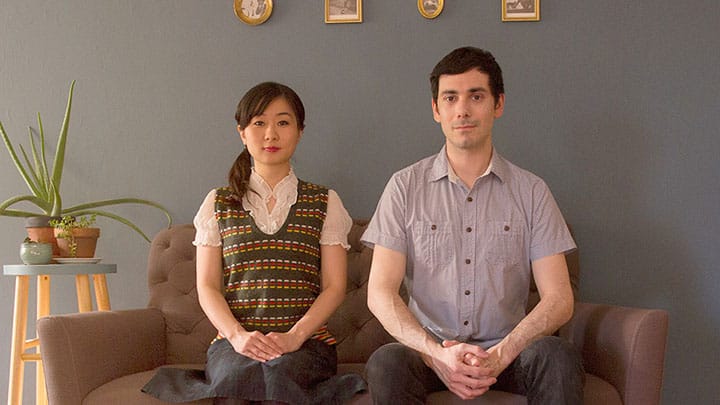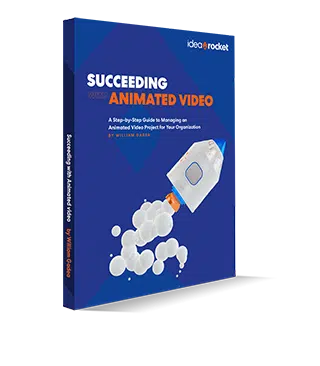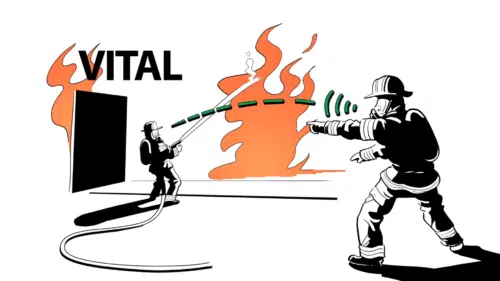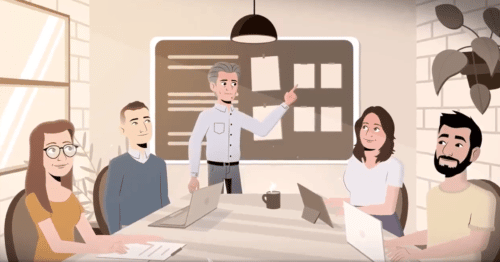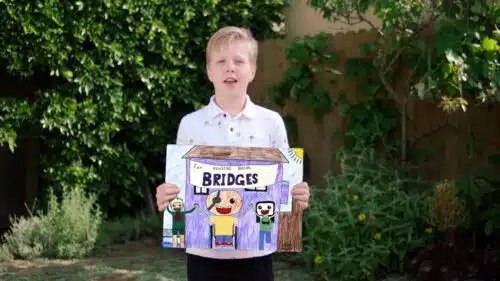Tiny Inventions is the directing team of Ru Kuwahata and Max Porter. They have caused a sensation in the animation world with their unique technique that combines stop-motion and hand-crafted photographed elements with After Effects puppetry. But of course, it would mean nothing if they weren’t masterful storytellers. We caught up with them during the production of their new film, Negative Space. Do not click away without seeing their work!
Blake Harris: Hey guys, we’re big fans of your work. Thanks for taking the time to chat with us. Before we get into the origins of Tiny Inventions, I’d love to hear about how you two first met.
Ru Kuwahata: [laughter]
Blake Harris: A story I’m sure you’ve never told before…
Max Porter: Never!
Ru Kuwahata: We met at a studio.
Max Porter: We should make a better story up than that.
Ru Kuwahata: I know. It’s so boring. But basically we just met at work. We were working at this studio in New York. Max was sitting a few feet away from me. And his back was pointed at me, so he didn’t know I was staring at him.
Blake Harris: And what did you notice about him…and his back?
Ru Kuwahata: So the way I work is to go really intense for a while, then I take a break, then back to intense, then break… But Max, I would just watch him work intensely all day long. He never checked his e-mail, never surfed the web. And I thought: wow, this guy has so much concentration. He has so much passion for this! So that’s was why I was intrigued to talk to him, this dedication.
Blake Harris: That’s amazing.
Ru Kuwahata: I still feel that way about him. Once he gets into something he doesn’t get out until he gets it done.
Blake Harris: [to Max] Is that true?
Max Porter: I guess so.
Ru Kuwahata: It is. Like if you did a time-lapse of him working it would look like a still shot.
Blake Harris: I assume that shortly thereafter you guys began dating. So I’m curious how you went from that to working together? Or did that come first?
Max Porter: I’ll fast-forward a little bit. So I remember very clearly…I liked the job I was working at (where we met) but I had kind of given up on my own work at that point. I was 25 years old. I never thought I’d make something on my own again. Or if I did, I thought it would be something like a television pilot. Something that wasn’t make for the sake of just being art. And I remember clearly, Ru and I were together for 6-7 months at the time and I was talking about how “Oh, I want to do this, I really want to do this” and she just said, “Okay, we’ll do it. Let’s try it. We’ll see if it works.” I guess it kinda…I just didn’t think it was possible to say okay let’s try something. But we did, and it worked really well the first time around. It just clicked. And I think it was because…it was just a real idealistic approach; we’re doing this for passion, we’re doing this because we love it, there’s no other real reason. It awakened something in me.
Blake Harris: What was that first project?
Ru Kuwahata: It was actually a Christmas card. It was a 3D illustration. Then we did another holiday animation. We did a bunch of small things on a personal basis and then started to think: okay, maybe we can make this into a fuller scale.
Max Porter: Then we started…Ru had started a project before we met that was teaching kids how to craft.
Ru Kuwahata: That didn’t work out very well!
Max Porter: No, but it was a good learning experience. It let us test out a few things.
Ru Kuwahata: Yeah, we tested out a few things until we formed Tiny Inventions and started taking jobs. Meanwhile, we started working on an independent film of our own. We thought it would only take 3-4 months but it ended up taking 2.5 years.
Blake Harris: Was that Something Left, Something Taken?
Ru Kuwahata: Yes.
Blake Harris: How did the idea for that project come about? I feel like there’s a lot of research that went into it with the forensic stuff!
Ru Kuwahata: It’s loosely based on a true story. We went to a film festival in San Francisco and the festival Director’s family member was our designated driver. And we just had this total New Yorker attitude of “why’s this guy acting so nice?”
Max Porter: [laughing]
Ru Kuwahata: And then one of the nights he decided to take us out to a “hidden bar” in the woods and we just totally freaked out in the back seat. So “just in case,” we decided to leave some evidence: the fingerprints and the hair. After that experience, we started to think maybe we can turn this into a film. Even before that we were so into Forensic Files. We used to watched one hour of Forensic Files before we went to bed, so we had all this knowledge of creepy forensics stuff…
Max Porter: Yeah, that was all “research.” And then we got more and more into learning about forensics while we were making the film; buying books and stuff.
Blake Harris: The film feels very autobiographical. Which, now, makes a lot of sense. But even before I knew how “true” it was, the story felt very personal. The characters had your names, you guys did the voices, etc. Was that a conscious decision or did it just sort of happen?
Ru Kuwahata: That wasn’t our original plan. But we basically had no budget. We were just really, really poor. Barely making a living in New York, so we had no choice but to use our own voices. And then we figured: if we’re going to use our own voices, then why not make the characters based on us? It was not so much an ideal decision for me. [To Max] What about for you?
Max Porter: I think sometimes in animation it tries to be really timeless. Something not specific. I don’t know. But at some point it felt like: you know, this is becoming a lot about us. For example: stuttering, which I actually do. And we thought: Let’s not get rid of this stuff. Let’s embrace it. Let’s try to make this about us in a way.
Ru Kuwahata: It was also somewhat early in our relationship so it was kind of interesting. There was something about trying to make ourselves into characters that was kind of nice.
Blake Harris: Did the success of Something Left, Something Taken open up a lot of new opportunities for you guys? There is a specialness and personal nature to your work…
Ru Kuwahata: It definitely led to a lot of opportunities. Independent film-wise, it directly led to a residency in the Netherlands.
Max Porter: Should we explain what that is a little bit? This was the Netherlands Institute for Animated Films (NIAF). And that was basically like a residency program for up to two years, where you get a stipend and they pay for you to live and work on your own project. And we started Between Times while we were at that residency. But then the residency shut down about halfway into our time there.
Ru Kuwahata: Yeah, the EU economy started to collapse and it led to a big cut in the art funds in the Netherlands. That was tough but luckily by then we had some other opportunities. The more work you do, the more you have to show people and get them to believe in you. So it’s a snowball effect. But Something Left Something Taken was definitely the beginning where we kind of left a mark.
Max Porter: I remember a friend of mine, way back when I was just starting in animation, he said, “nobody is ever going to pay you to do something you haven’t done already.” So I think for us, Something Left, Something Taken was us saying we can make a longer project by ourselves. We can tell a story. We can do it all ourselves. So having that project was helpful when we wanted to do other things.
Ru Kuwahata: Yeah. We started to get some commercial opportunities and developed a reputation as “mixed media directors.”
Blake Harris: Max, you had mentioned earlier that this idea of doing more personal things was kind of like a reawakening. There was a purity to it. When you started taking those commercial opportunities…I guess my question is: do you feel a difference working on something that’s yours versus working on a project for someone else?
Max Porter: Well there was something that Ru once said. “When we’re working for clients and doing a job, it is a lot easier than our own work because the answers are given to us.” Meaning that the client knows what they want; or, at the least, they make the final decisions. We contribute and collaborate the best way we can, but it’s a much different process than just having a blank sheet of paper in front of us and asking ourselves: okay, we can do anything, but what do we want to do? That’s a really hard question to answer. And it’s even harder when both of us have to feel strongly about what we’re going to put on that blank piece of paper.
Ru Kuwahata: Yeah.
Blake Harris: Tell me a little bit about the division of labor on a project. Do you guys have formalized responsibilities, or does it change with each project?
Ru Kuwahata: I think the roles are generally defined, although on each project we might shift. But when we first started working together, there was a feeling like: oh shoot, we overlap too much in our specialty as freelancers. We were both more into design than animation. So what ended up happening was we both taught ourselves some different things and developed a pipeline where we pass responsibilities back and forth.
Max Porter: Yeah. In the beginning of every project, we’re always writing together and deciding what the shots are. The storyboards, the animatic, the writing; those are all collaborative. Then once we move into production, Ru takes over the design. Then once we go into the photography and the lighting, I take over that. Ru really has the say over the character animation; I’ll have the say over inanimate object animation and the special effects. Then I’ll do the compositing and editing and most of the post. So it really is a bouncing back and forth.
Blake Harris: Once you guys have a pretty thorough script down on the page, how much do your projects end up changing? Do you guys stick pretty closely? Or is it really more just a compass that’s guiding you?
Max Porter: It’s different for every projects. I’ll give a few examples. Like Something Left Something Taken, we had a general outline, but a lot of it was written in the recording sessions actually. We improvised certain lines. We looked at what we had and then we built an animatic around that. Between Times was a really hard project to write because we started off with a totally different project and then it evolved. Like the script totally changed.
Ru Kuwahata: [cracking up]
Max Porter: But with both those projects, once that animatic was down, it didn’t change much from that point. So we’re talking 9-12 months just for the writing and the animatic.
Blake Harris: What did Between Times start out as?
Max Porter: I don’t’ want to say exactly because I like the project and still might want to do it one day.
Ru Kuwahata: He keeps saying that! [mocking Max] “Maybe for our next project…”
Blake Harris: That’s hilarious.
Max Porter: I really like the original version. But suffice to say it was a really depressing story. It was a downer. And part of the reason we abandoned it was not because it was a bad story or didn’t have potential, it was just that we didn’t feel like working on a project like that at that point in our lives.
Ru Kuwahata: Winter was coming. It was so dark! It was a depressing story.
Max Porter: To make it simple: the original story was about two clocks falling out of sync. We changed it so that it was about two clocks falling in sync.
Blake Harris: One last question for you two: as a viewer, whenever I watch one of your projects—whether it’s an independent film like Something Left, Something Taken or commercial project, like your ad for Ben & Jerry’s—I feel a strong sense of joy and magic and wonder. Your work always puts a smile on my face and makes me feel at ease. Is that intentional? Like are those emotions an objective of yours?
Ru Kuwahata: I don’t know if we ever talked about it. Have we?
Max Porter: This is a great question.
Ru Kuwahata: [laughing]
Max Porter: I don’t think there’s ever a conscious “we want you to feel this way.” But I think there’s a sensibility that we tend to get across. I don’t know if it was ever necessarily by choice, but it’s very much our sensibility. And I think that comes from, I don’t know, kind of just the conversation that we have together. That back and forth, I guess, makes the work the way it is. But I don’t think we ever set out to make people feel a certain way because that’s really a personal thing that the audience should take away.
Ru Kuwahata: I also feel like…we’re kind of crazy. We don’t really do anything except to work on our projects. The other day someone said to me, “You have no life, you’re just zombies.” And I thought, “That’s actually kind of true.” [laughs] That’s kind of how we are. But we are having a lot of fun because we find joy in small things. Like lately our conversation is that no matter where we go, we keep running into this man with two white dogs. Since we moved to France, we hadn’t found that man, but a couple of nights ago we run into this man and turn to each other and say “Finally, we found him in this scene!” So we have all these small things that are part of our universe. So when people hear our conversations, they look at us like what the hell are you talking about? But we giggle at these small things.
Blake Harris: I sincerely hope that never changes. That’s wonderful to have that little universe of your own.
Max Porter and Ru Kuwahata: Thank you.
